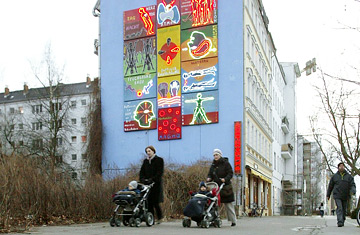
A building in Berlin's Prenzlauer Berg district.
Hipness is not dead in Berlin; it simply grew up and started having babies. Just take a look at Prenzlauer Berg, an island of cool that may right now have the highest birth rate in all of Germany. The neighborhood was once was a refuge for East Berlin's communist-era bohemians communing beneath the radar of the dreaded Stasi secret police. Then, after the Berlin Wall fell, hipsters from the other side poured in to the district, opening cafes and night clubs on every corner.
Soon enough, the starving-artist types began to get paying work in the new Germany — film roles, book deals, selling paintings banned by the communist authorities. The streets of Prenzlauer Berg pulsated night after night to the rhythm of dancing bodies, flowing cash and a consensual belief there was nowhere else in the world better to be at that precise moment.
Then came the BMWs and Mercedes, the calm of post-nightclubbling Sunday mornings shattered by infant screams, and before I knew it, I was navigating my way past Bugaboo baby carriages to get a seat at one of my favorite haunts near Helmholtzplatz. It's called Wohnzimmer (Living Room), and the new moms, toddlers and baby carriages that now predominate make it looks more like the Nursery.
"The young hipsters all came here and then they just grew up and starting having babies," says Jana von Oheimb-Rosta, a slim 34-year-old with jet black hair, as she lurches to grab her four-year-old before he bolts. She came to Prenzlauer Berg as a teenager before the Wall fell, and lived in an occupied house. "Now, the entire yuppie world is moving in here," she says.
But there aren't enough yuppies in this notoriously working class city to explain where all the babies are coming from. In the first quarter of 2007, 6,479 babies were born in the German capital, up from 6,169 the same quarter last year. In fact, births have been on the rise at least since the first quarter of 2001, when 5,936 babies were born.
Renata Brink, 47, casts a wary eye as her two sons, aged four and nine, plot their next moves at the crowded playground. Her explanation for the apparent baby boom is that the newborns and their happy parents are like magnets attracting other parents and even more hopeful couples to this corner of the city. "It seems everybody has kids, so you have a great network for families," she says.
The baby boom is certainly having an impact on local business. In my street alone, with exception of the Kaya Foundation store for marijuana paraphernalia and the Soap and Cosmetics Caf, every store and boutique seems targeted at the city's littlest consumers. There's the Finnish Fashion for Children boutique, the Kronjuwel (Crown Jewel) boutique for designer baby clothes and the Captivation Photography studio showcase plastered with pictures of bulging moms-to-be, dads with kids, grandmas with kids, kids with kids.
"Every day about 70 to 100 mothers come in here," says Carina Peters, 37, owner of the children's second-hand clothing store Neufundland-Berlin.de. Two boys are playing in the corner, throwing plastic animals around the room. I scowl in their direction as a shark whizzes past my ear.
Around the corner is the caf Alois S., whose owner, a balding 48-year-old named Lothar Heer clad in a Grateful Dead t-shirt, says his original plan was to build a tapas bar. That was 2001, when his establishment stood alongside a playground bearing the scars of communist neglect. After fighting with sluggish city bureaucrats for a couple of years, Heer got permission to break open the walls and open a terrace out onto the playground. Then, he and some local parents formed a citizens group and applied for and were actually awarded some 20,000 euros ($27,000) from the European Union to bring the playground up to the standards of the free world.
"Ever since then, this place has been really hopping every day from three o'clock until dark. That's when the mothers come with their kids," he says, as he pours a glass of beer. "Now the playground is twice as big as it used to be, and we put in all new equipment."
The hipness of Prenzlauer Berg certainly isn't dead; it just sometimes smells kind of funny — which is why so many of the neighborhood's establishments now offer diaper-changing stations in their bathrooms.
